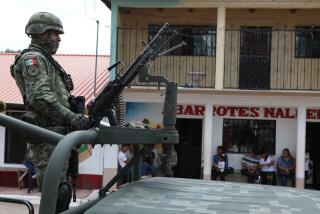Spanish Troops Do Their Duty, but With Heavy Hearts
- Share via
DIWANIYA, Iraq — Their incoming prime minister has decried their presence. Their compatriots back home have overwhelmingly rejected their mission. La Guerra de Bush -- Bush’s War -- has become an epithet in their homeland.
But the troops of Spain’s Plus Ultra Brigade II, many from the same hardscrabble Extremadura soil as the conquistadors Pizarro and Cortes, soldier on in south central Iraq.
“Seeing what happened in Madrid, one feels so powerless here,” Lt. Roberto Fallola said Thursday, reflecting on last week’s bombings in the Spanish capital and the subsequent elections that ousted the Popular Party, which sent Spanish troops to Iraq. “In the end, though, it’s the politicians who ultimately decide what we do, where we go.”
It is an odd time for the 1,300 Spanish troops in Iraq. The zone they patrol is relatively peaceful, and the soldiers -- many wearing neatly trimmed beards and mustaches in the Spanish military custom -- appear altogether more relaxed than the U.S. troops who occupy the much more violent zone to the north.
In recent days, though, the Spanish soldiers have had to absorb the Madrid bombings, which killed more than 200, and the subsequent elevation of a new leader who has pledged to pull Spain’s troops from Iraq unless there is a new U.N. mandate authorizing their presence.
“We have been watching the news from Spain very closely,” said Maj. Carlos Herredon as he spoke over strong black coffee in a lounge area on the former Iraqi military base where the Spanish are billeted, in this agricultural and manufacturing center 125 miles southeast of Baghdad. “Everyone was stunned” by news of the bombings.
Still, the election results may have been even more of a shock. Almost overnight, the soldiers’ role here went from a defining source of pride for the nation’s top elected official to a target of harsh criticism from the incoming prime minister, Jose Luis Rodriguez Zapatero.
Spanish troops interviewed on the sprawling base here declined to discuss the political situation at home. Nervous officers assigned to accompany reporters forbade impromptu interviews with ordinary soldiers.
Nevertheless, there was little doubt that the attacks in Madrid had the same resounding effect on these soldiers as they did on the people back home. Several spoke of a frustration over being so far away at such a crucial moment.
“Our work is here, our mission is here, but of course we suffered for our countrymen,” said Lt. Col. Pascual Ruiz Iribarne, an imposing 54-year-old who runs the base hospital. “These are episodes that mark a nation forever.”
The Spaniards are deployed under the umbrella of the Polish-led multinational division. Working alongside the Spaniards are soldiers from Central America and the Dominican Republic. U.S. officials have called the Spanish a valuable partner -- but have hastened to add that someone would fill their role should Spain withdraw.
The Spaniards’ tasks here encompass the usual twofold Iraqi mission: providing security and training new Iraqi armed forces; and engaging in sundry civil affairs projects, from restoring schools and drainage systems to installing soccer fields and assisting in the formation of local governments.
On Thursday, one unit provided supplies to a care center for the disabled in Diwaniya, while another went on a foot patrol through town with police.
The population in this zone is overwhelmingly Shiite Muslim. Residents largely rejoiced at the toppling of Saddam Hussein.
That is not to say there is no threat in a country where all Westerners have seemingly become potential targets. Gonzalo Perez Garcia, 42, a major in the Spanish civil guard, died last month after being shot in the head while participating in an operation with Iraqi police in the nearby city of Hamsa. Two other officers were injured in a grenade attack last month.
Many of the soldiers here are veterans of Spanish peacekeeping units that were deployed in the Balkans and Afghanistan. Spain’s is a professional volunteer army, like the United States’, and the young men in particular seem excited about being on duty here.
The current contingent of Spanish troops is scheduled to go home next month. Another shift is on track to replace them and serve until June 30. That is when Spain’s one-year commitment to the U.S.-led coalition expires. Whether Spanish troops will return remains to be seen.
“We will follow our orders,” Fallola said as he and a colleague headed toward a sentry post in a flat desert landscape ribboned with green where rivers and canals slice through the dryness. “We are soldiers.”
More to Read
Sign up for Essential California
The most important California stories and recommendations in your inbox every morning.
You may occasionally receive promotional content from the Los Angeles Times.










